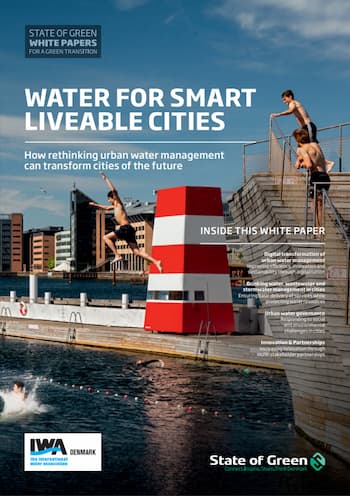Download our publication on water for smart liveable cities today
This article is part of our publication ‘Water for smart liveable cities’
Download nowPerspective
Flood prevention
Urban water management
Water management


More than half of the world’s population now live in cities and often cities do not have sufficient water of adequate quality within the city limits to secure water for consumption. This can be a serious constraint on the health of the population and economic growth. In order to secure availability of water, many cities need to take action by bringing in water from outside the city limits.
In Denmark, national action has been taken to secure knowledge of water resources and since 2000, mapping of groundwater resources has been the backbone of groundwater protection plans, partly inanced by a tax on drinking water. Data from water planning, monitoring and risk assessmentare freely available in Denmark which supports a shared and basin connected effort on groundwater protection.
Cooperation with stakeholders at basin scale is necessary in order to harvest the benefits from the shared information about the quality and availability of surface and groundwater and to share the resources between the different users in the basin, while also ensuring a sufficient amount of water in natural water bodies such as rivers, lakes and wetlands. The International Water Association has developed an Action Agenda for Basin Connected Cities. The Action Agenda builds on IWA’s 17 Principles for Water-Wise Cities. It highlights three risk factors that need attention by urban stakeholders:
This is a very simple principle, yet often difficult to follow in daily water management practice. To ensure proper water quality, urban water managers need to pay attention to the basin area the city is connected to and where the city gets its water from. In Denmark, there is a tradition for cooperation between different stakeholder groups across administrative borders as a means to secure a healthy water environment and protect boreholes and water abstraction areas, whether the water source is surface water or groundwater, as is the case in Denmark.

This article is part of our publication ‘Water for smart liveable cities’
Download nowBasin-wide cooperation on managing and treating wastewater from all polluters such as households, industries and agriculture is also important. It paves the way for the most efficient treatment solutions in a cost-efficient manner. It is important to ensure that wastewater is treated in the
whole basin area. Otherwise, it may harm surface or marine waters near other cities and communities. If the treatment is inefficient, it will have severe consequences for the whole basin area and the environment, fisheries and bathing water quality. It will also become more expensive for water consumers to clean up the environment after the damage is done.
Climate change has an impact on nearly all cities as many can look forward to more extreme weather events in the future. Cities will experience more heavy rainfalls and/or flooding from rivers and streams or rising sea levels and storm surges. Activities in the open land outside the city will have an enormous impact on how the city will be affected by flooding. It may be wiser to manage heavy rain on farmland than by flooding cellars in residential areas. Nature Based Solutions allow local drainage of rainwater and may offer better room for water storage in rivers and streams than concrete
canals and paved areas.
Aligning basin management with the development of liveable cities depend on a strong cooperation between all basin stakeholders. A common vision combined with trust, reliable water resource information, planning tools and digital solutions enable joint decision making across different stakeholders in the basin. For Denmark, basin-wide approaches arerelated to the demands from the EU Water Framework Directive calling for adoption of River Basin Management Plans in EUcountries and for transboundary basin areas. Accordingly, Denmark has been distributed into one international and three national river basin districts.
Furthermore, the UN Sustainable Development Goals state that all countries have to implement calls for integrated and basin-wide approaches to water management. It even has a dedicated target (SDG 6.5) which aims to implement integrated
water resources management at all levels by 2030, including through transboundary cooperation as appropriate.
solutions
Climate change adaptation
+4
Perspective
Sector coupling
+9